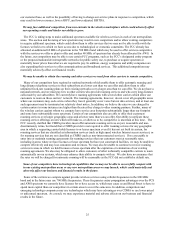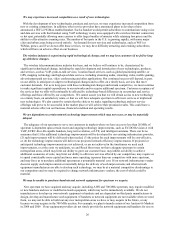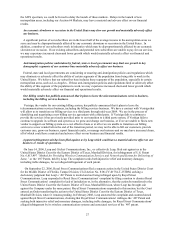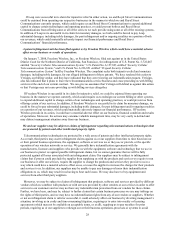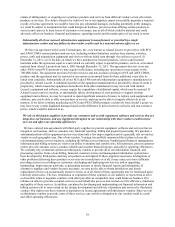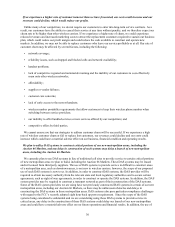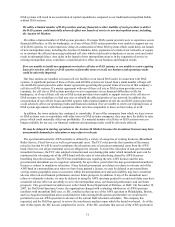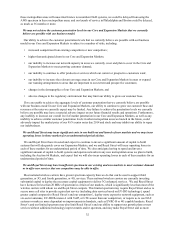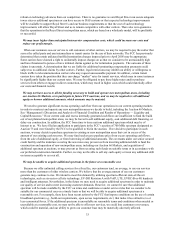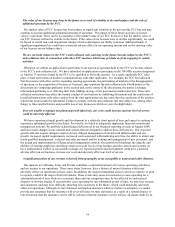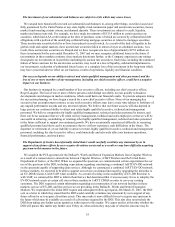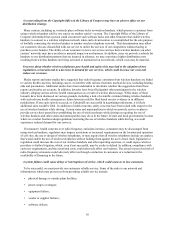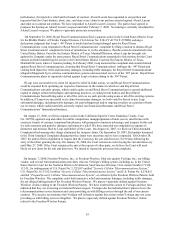Metro PCS 2007 Annual Report Download - page 44
Download and view the complete annual report
Please find page 44 of the 2007 Metro PCS annual report below. You can navigate through the pages in the report by either clicking on the pages listed below, or by using the keyword search tool below to find specific information within the annual report.33
reliant on technology advances than our competitors. There is no guarantee we and Royal Street can secure adequate
tower sites or additional spectrum or can have access to DAS systems or that expected technology improvements
will be available to support Royal Street’ s and our business requirements or that the cost of such technology
improvements will allow Royal Street and us to remain competitive with other carriers. There also is no guarantee
that the operations in the Royal Street metropolitan areas, which are based on a wholesale model, will be profitable
or successful.
We may incur higher than anticipated intercarrier compensation costs, which could increase our costs and
reduce our profit margin.
When our customers use our service to call customers of other carriers, we may be required to pay the carrier that
serves the called party and any intermediary or transit carrier for the use of their networks. The FCC has previously
determined that certain unilateral tariffed termination charges imposed prior to April 2005 may be appropriate.
Some carriers have claimed a right to unilaterally impose charges on us that we consider to be unreasonably high
and have threatened to pursue or have initiated claims against us for termination payments. The outcome of these
claims is uncertain. A determination that we are liable for additional terminating compensation payments could
subject us to additional claims by other carriers. Further, legal restrictions may inhibit our ability or willingness to
block traffic to telecommunication carriers who may request unreasonable payment. In addition, certain transit
carriers have taken the position that they can charge “market” rates for transit services, which may in some instances
be significantly higher than our current rates. We may be obligated to pay these higher rates and/or purchase
services from others or engage in direct connection, which may result in higher costs which could materially affect
our costs and financial results.
We may not have access to all the funding necessary to build and operate new metropolitan areas, including
our Auction 66 Markets, or to participate in future FCC auctions, and we may be required to sell additional
equity or borrow additional amounts, which amounts may be material.
We need to generate significant excess operating cash flow from our operations in our current operating markets
in order to construct and operate any new metropolitan areas we decide to build, including the Auction 66 Markets.
See “Management’ s Discussion and Analysis of Financial Condition and Results of Operations — Liquidity and
Capital Resources.” If our current cash and excess internally generated cash flows are insufficient to fund the build
out of our planned metropolitan areas, we may be forced to sell additional equity, seek additional debt financing, or
delay our construction. In addition, the FCC from time to time auctions additional spectrum which may be of
interest to us. We have filed an application to participate in the FCC’ s auction of 700 MHz spectrum designated as
Auction 73 and were found by the FCC to be qualified to bid in the auction. If we decide to participate in such
auctions, we may decide to purchase spectrum in existing or new metropolitan areas that cost in excess of the
amount of our existing cash reserves. We may fund such excess purchase price from excess operating cash flows,
from the sale of additional equity, or from borrowing of additional amounts. The covenants under our senior secured
credit facility and the indenture covering the new notes may prevent us from incurring additional debt to fund the
construction and operation of new metropolitan areas, including our Auction 66 Markets, and acquisition of
additional spectrum at auctions, or may prevent us from securing such funds on suitable terms or in accordance with
our preferred construction timetable. Further, we may not be able to sell any such equity or incur any additional debt
on terms acceptable to us or at all.
We may be unable to acquire additional spectrum in the future at a reasonable cost.
Because we offer unlimited calling services for a fixed fee, our customers tend, on average, to use our services
more than the customers of other wireless carriers. We believe that the average amount of use our customers
generate may continue to rise. We intend to meet this demand by utilizing spectrum-efficient state-of-the-art
technologies, such as six-sector cell site technology, EV-DO Revision A with VoIP, LTE, EVRC-B or 4G handsets
and intelligent antennas. Nevertheless, in the future we may need to acquire additional spectrum in order to maintain
our quality of service and to meet increasing customer demands. However, we cannot be sure that additional
spectrum will be made available by the FCC on terms and conditions or under service rules that we consider to be
suitable for our commercial uses on a timely basis or that we will be able to acquire additional spectrum at a
reasonable cost. For example, there have been recent actions by the FCC that impose conditions on the use of certain
broadband spectrum (e.g., build-out requirements, open access requirements, etc.) that make it less attractive to or
less economical for us. If the additional spectrum is unavailable on reasonable terms and conditions when needed or
unavailable at a reasonable cost, we may not be able to offer new services, we could lose customers or revenues,
which could be material, and our ability to grow our customer base may be materially adversely affected.




